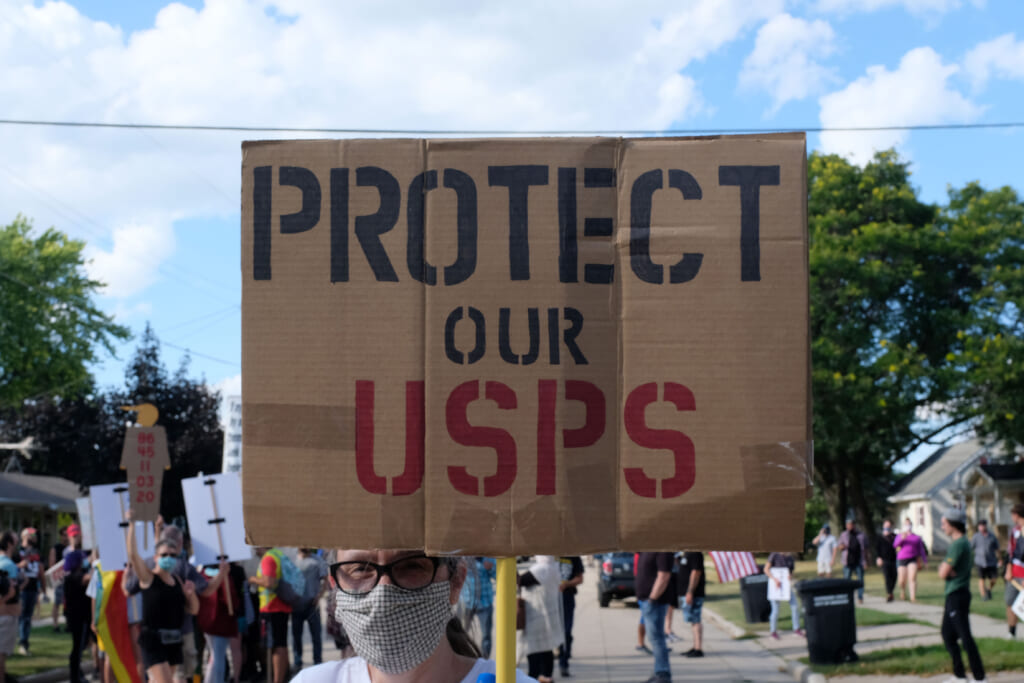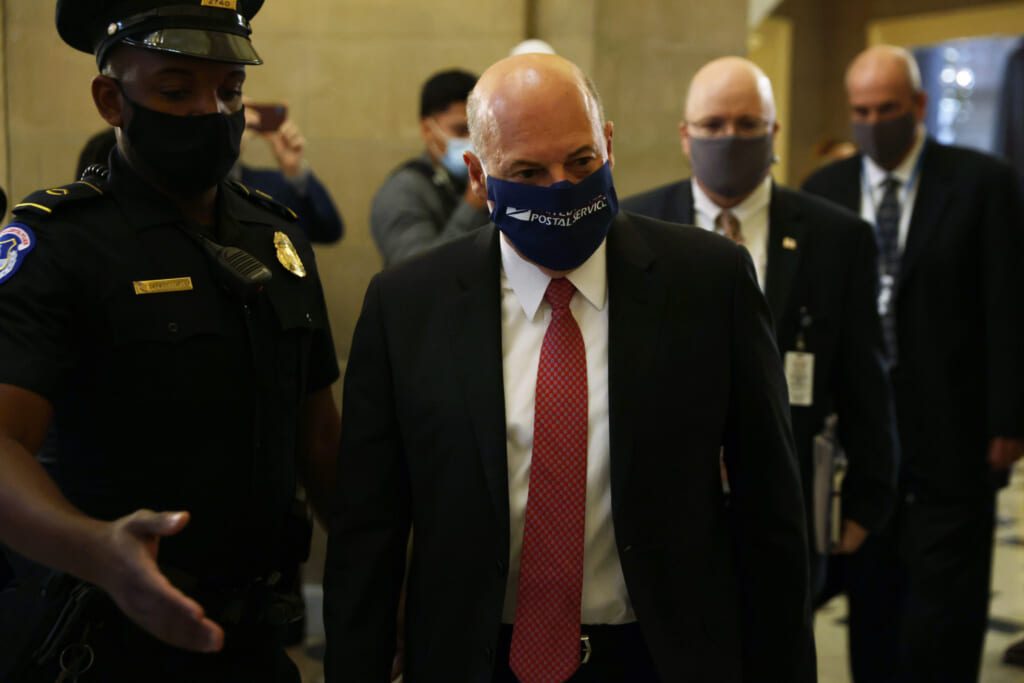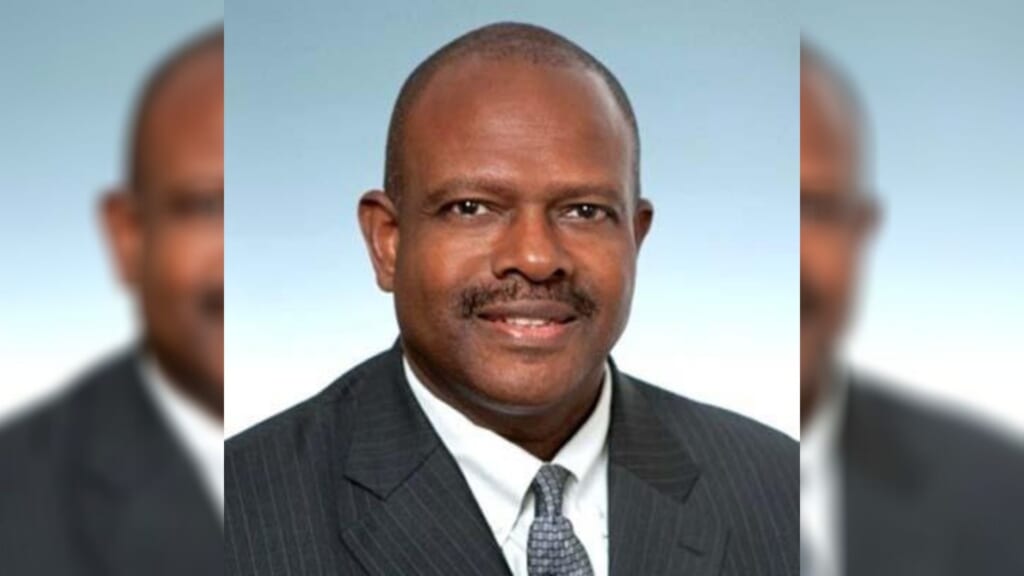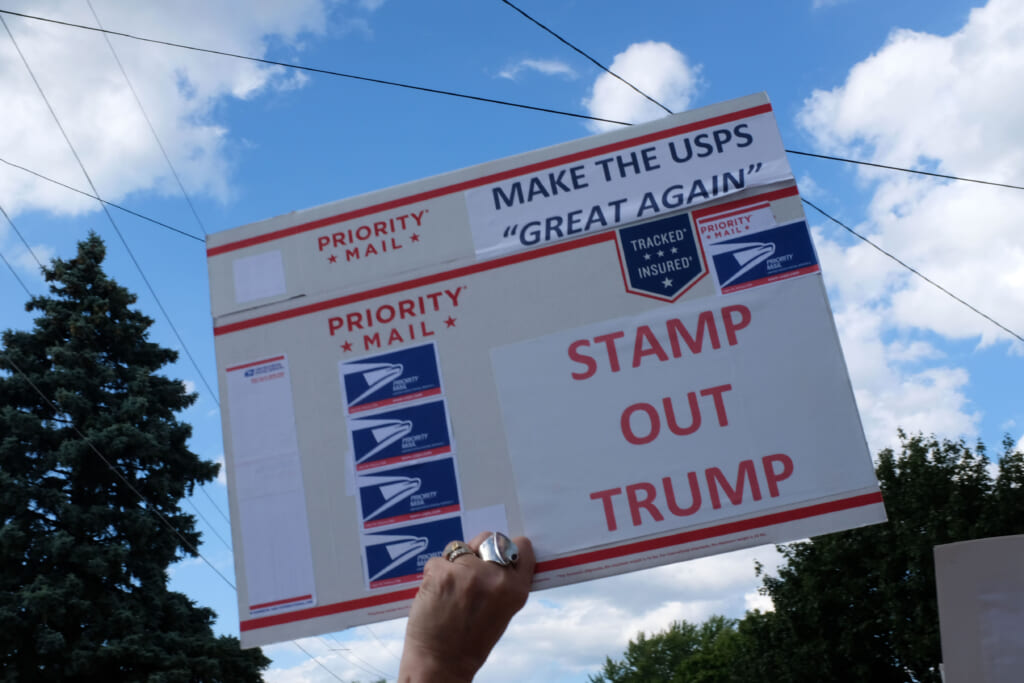Meet the Black man who could have saved the US Postal Service
OPINION: If every government agency was filled with clones of D. Michael Bennett America would be a better place.
Donald Trump is on a rampage to steal the 2020 presidential election by gutting the United States Postal Service. Since his administration’s horrible mismanagement of the COVID pandemic, millions of Americans will choose to vote by mail this fall, and Trump is afraid that will mean the end of his presidency.
Despite years of promises, the president can’t build a wall fast enough to stop the Blue Wave that’s coming this fall but he has been using his newly appointed US postmaster general, Louis DeJoy, to remove mailboxes from Black neighborhoods, raise the price of bulk mail ballots, and dismantle mail sorting machines in Democratic strongholds.
Read More: US Postal service warns states may miss mail-in ballot deadlines

Obviously, all of this is terrible, and like most Americans, I wanted to find out how we got here, and more importantly if there’s anything we can do to save the USPS before Election Day on Nov. 3. The answer to the second question was surprising, the answer to the first? Downright shocking.
Since the Postal Reorganization Act of 1970, the U.S. postal service has been run by a nine-member board of governors, appointed by the president and approved by the Senate. Governors serve for staggered seven-year terms that end on Dec. 8 each year and require a quorum of 6 sitting members to be fully functional.
What do they do? The board approves budgets, sets stamp prices, and most importantly, can fire the sitting postmaster general. However, in December 2016, just about a month before former President Barack Obama left office the board was down to just one member. Why? Because Obama’s last several appointees were being blocked. Who were they being blocked by?
Let’s put in a pin in that for now.
Due to the Obama appointees being blocked, Trump has been able to fill the Board of Governors with compliant and feckless appointees who look the other way while DeJoy dismantles the only truly safe means of voting during the coronavirus pandemic just 80 days before the election.

Read More: Democrats investigate the head of USPS after sudden changes
Wouldn’t it be great to have someone on the Board of Governors with an election background right now? Why on earth were so many Obama appointees blocked? Was there any other option? Most importantly with a board full of mini-Trumps, is there any way to fix what is happening now? For answers, I decided to ask an expert, D. Michael Bennett.
Who is D. Michael Bennett, and why does he matter to the great postal service heist of 2020? Bennett is a Duke University alumnus and George Washington University lawyer who specializes in logistics and technology at Evans & Chambers, an IT company based in Washington D.C. But that’s not why he’s important to the story.
Bennett was the last African American appointed to the Postal Service Board of Governors by President Obama. He was appointed twice, alongside a slate of both Republicans and prominent Democrats like Victoria Reggie Kennedy (Ted Kennedy’s widow). Bennett passed vetting and Senate hearings but never got to serve on the board. Did I mention that his step-father is a retired postal worker and Bennett’s chair of the Board of Elections for Washington, D.C.?

“I’m kind of a unicorn”, Bennett joked when we spoke from his car in the morning. He is a rare example of a high-level official with both intimate knowledge of the post office and modern election management. While he never got to serve, his enthusiasm for the agency and its potential knows no bounds.
“I love the post office!” he exclaimed on the phone. “To me, the post office is the tip of the spear in the new American economy. It’s such an incredible institution … I was really excited to be on the board!”
If every government agency was filled with clones of D. Michael Bennett America would be a better place. He was so passionate about what the government can do for the American people and the postal service in particular. During his Senate hearings he talked about improving mail delivery across America, beefing up the technology mail carriers could use and the resources at their disposal.
“My thing was, how do you get the mail delivered in like 5 hours? The Senate seemed to like it, and the unions liked it primarily because it (his plan) supported more work for postal workers, so that was great,” Bennett said.
Read More: Postal Service removing mail sorting machines as election nears
Which begs the question, if he was nominated, vetted and went through a Senate confirmation, why isn’t D. Michael Bennett sitting on the Board of Governors for the USPS today? This part gets a little complicated and while I’d love to School House Rock the intricacies of Senate procedure, it’s easier to have Bennett explain it.
“Everybody has to agree to a slate of appointees,” said Bennett, “so it’s like does everyone agree to all of these board members? What they do is yay or nay, and if it’s not unanimous then you’re taken off the agenda. The board is done the same way, so you can have one Senator that objects to this particular thing and that’s it.”
So who was that one senator? Sen. Bernie Sanders of Vermont.
(Told you that second answer would be shocking).

Sanders is known as a champion of the United States Postal Service, so why was he blocking Obama’s nominees right and left and keeping the Board of Governors from being fully functional? The senator was well-intentioned; he was concerned about two Republican nominees who wanted to privatize parts of the postal service and shut down Saturday mail delivery. He was also acting with the support of some key unions and the NAACP.
There is no way Sanders could have predicted that four years in the future we would be in a global pandemic that made the mail essential to voting Donald Trump out of office.
However, since the appointees were all-or-nothing slates, objecting to any of them meant the entire group was scuttled. When Sanders put a hold on Republican nominees, Republican senators predictably retaliated and blocked the rest of the slate, which included Democrats.
Let’s be clear about what happened. Bernie Sanders is one of the foremost experts in the Senate on the USPS, so any argument that he was only blocking bad Republican nominees without taking responsibility for knocking out the Democratic nominees is akin to claiming you only took a strong stand against peanut butter when you know full well the only thing on the menu is peanut butter and jelly sandwiches.
Sanders staffers made the all-or-nothing argument at the time saying, “no board is better than a bad board” in an interview with The Washington Post in 2015.
Now that we know why we’re here with the United States post offices, what can be done moving forward? Democrats have called on the FBI and the inspector general to investigate Trump’s tampering with the mail and have DeJoy coming in to testify this week.

No one knows if any of those moves will be able to make a difference before the election. According to Bennett, who is chairman of the D.C. Board of Elections (and Washington, D.C. is a larger population than two states, Wyoming and Vermont) our best bet may be at the state level.
“What we’re doing in D.C. is we are sending ballots out to all 460,000 plus registered voters,” Bennett said. Absentee ballot requests went from an average of 60,000 to 100,00 this year in D.C., so they expanded absentee voting, early voting, and will open up sports arenas as super-voting centers this fall for those who still want to vote in person.
How has Bennett managed things thus far? Apparently pretty well. In July, the Brookings Institute handed out grades for management of COVID-19 pandemic voting and the District of Columbia was one of only seven states or municipalities to receive an “A.”
D. Michael Bennett alone couldn’t have saved the USPS Board of Governors from Trump’s clutches, and he alone wouldn’t be able to stop Louis DeJoy from trying to rig the 2020 election. However, it’s worth considering that he, along with several other Democratic Obama appointees, likely wouldn’t have been in favor of gutting the post office to help Trump win an election, or privatize the agency (something that even Trump appointees haven’t been able to do in four years).
Now we’re depending on the skills, creativity and financial savvy of literally hundreds of local postmasters, governors and state election directors to keep 2020 from becoming the nightmare that Donald Trump wants it to be.
It will be a tough fight regardless but might’ve been a bit easier with help from men like Michael Bennett on the inside.
Have you subscribed to theGrio’s podcast “Dear Culture”? Download our newest episodes now!

Dr. Jason Johnson is a professor of Politics and Journalism at Morgan State University, a Political Contributor at MSNBC and SIRIUS XM Satellite Radio. Notorious comic book and sports guy with dual Wakandan and Zamundan citizenship.
